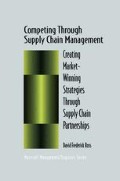Abstract
Although supply chain management (SCM) has only recently appeared as one of today’s most powerful strategic business concepts, its development can be traced back to the rise of modern logistics. In fact, although SCM represents a radically new approach to leveraging the supply channel in the search for order-of-magnitude breakthroughs in products and markets, it, nevertheless, is closely connected with and in many ways is the product of the significant changes that have occurred in logistics management. Over the past 30 years, logistics has progressed from a purely operational function to become a fundamental strategic component of today’s leading manufacturing and distribution companies. As logistics has evolved through time, the basic features of SCM can also be recognized—first in their embryonic states as an extension of integrated logistics management, and then, as a full-fledged business philosophy encompassing and directing the productive efforts of whole supply chain systems. A comprehensive understanding of SCM, therefore, requires a thorough understanding of the evolution of logistics management.
Access this chapter
Tax calculation will be finalised at checkout
Purchases are for personal use only
Preview
Unable to display preview. Download preview PDF.
Notes
Arch W. Shaw, Some Problems In Market Distribution. Cambridge, MA: Harvard University Press, 1915, pp. 7–12.
Ibid,pp. 41–44.
Peter F. Drucker, “The Economy’s Dark Continent,” Fortune (April 1962), 103–104.
Peter F. Drucker, “Physical Distribution: The Frontier of Modern Management,” speech reprinted in Donald J. Bowersox, Bernard J. LaLonde, and Edward W. Smykay, Readings in Physical Distribution Management: The Logistics of Marketing. London: Macmillan, 1969, pp. 3–8.
David F. Ross, Distribution: Planning and Control. New York: Chapman & Hall, 1996, pp. xi-xix, and Robert N. Anthony, The Management Control Function. Boston, MA: Harvard Business School Press, 1988, pp. 3–24.
Alan C. McKinnon, Physical Distribution Systems. New York: Routledge, 1989, p. 4.
Donald J. Bowersox, “Emerging Patterns of Physical Distribution,” in Readings in Physical Distribution Management,pp. 276–277.
Donald J. Bowersox, “Physical Distribution Development, Current Status, and Potential,” in Readings in Physical Distribution Management,pp. 375–376.
Jeffrey Karrenbauer, “Distribution: A Historical Perspective,” in James F. Robeson and Robert G. House, eds., The Distribution Handbook. New York: The Free Press, 1985, pp. 4–5.
David F. Ross, Distribution: Planning And Control,pp. 17–19.
Wendell M. Stewart, “Physical Distribution: Key to Improved Volume and Profits,” in Readings in Physical Distribution Management,pp. 375–376.
Donald J. Bowersox, “Distribution Logistics: The Forgotten Marketing Tool,” in Readings in Physical Distribution Management,pp. 375–376.
Shaw, pp. 44.
Bernard J. LaLonde and Leslie M. Dawson, “Early Development of Physical Distribution Thought,” in Readings in Physical Distribution Management,pp. 375–376.
Raymond LeKashman and John F. Stolle, “The Total Cost Approach to Distribution,” in Readings in Physical Distribution Management,pp. 207–208.
Douglas M. Lambert, The Development of an Inventory Costing Methodology: A Study of the Costs Associated with Holding Inventory. Chicago, IL: National Council of Physical Distribution Management, 1976.
D. M. Lambert, J. F. Robeson, and J.R. Stock, “An Appraisal of the Integrated Physical Distribution Management Concept,” International Journal of Physical Distribution and Materials Management 9 (1) (1978), 74–88
Ross, Distribution: Planning and Control,pp. 20–21.
Bernard LaLonde, “Evolution of the Integrated Logistics Concept,” in James F. Robeson, and William C. Copacino, eds. The Logistics Handbook. New York: The Free Press, 1994, pp. 9–10.
Wendell M. Stewart and William J. Markham, “The Role of the Physical Distribution Manager,” in The Distribution Handbook,pp. 35–37.
James M. Masters and Terrance L. Pohlen, “Evolution of the Logistics Profession,” in The Logistics Handbook,pp. 26–27.
Ibid,pp. 27–28.
This section is based on David F. Ross, “Aligning the Organization for World-Class Manufacturing,” Production and Inventory Management Journal 32 (2) (Second Quarter 1991), 22–26 and Distribution: Planning and Control,pp. 26–36.
Charles M. Savage, Fifth Generation Management. Burlingtom, MA: Digital Press, 1990, pp. 152–156.
Gary Hamel and C.K. Prahalad, Competing for the Future. Boston, MA: Harvard Business School Press, 1994, pp. 317–323.
Ross, Distribution: Planning and Control,pp. 33–34.
Thomas G. Gunn, In the Age of the Real-Time Enterprise. Essex Junction, VT: omneo, 1994, pp. 104–106.
Author information
Authors and Affiliations
Rights and permissions
Copyright information
© 1998 Springer Science+Business Media New York
About this chapter
Cite this chapter
Ross, D.F. (1998). Evolution of Supply Chain Management. In: Competing Through Supply Chain Management. Springer, Boston, MA. https://doi.org/10.1007/978-1-4757-4816-1_3
Download citation
DOI: https://doi.org/10.1007/978-1-4757-4816-1_3
Publisher Name: Springer, Boston, MA
Print ISBN: 978-1-4419-4727-7
Online ISBN: 978-1-4757-4816-1
eBook Packages: Springer Book Archive

